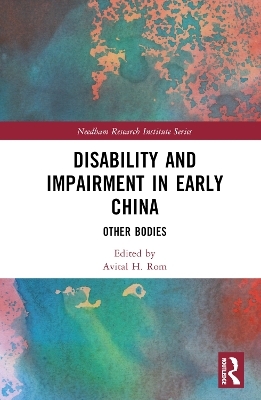
Disability and Impairment in Early China
Routledge (Verlag)
978-1-032-25519-4 (ISBN)
- Noch nicht erschienen (ca. März 2025)
- Versandkostenfrei innerhalb Deutschlands
- Auch auf Rechnung
- Verfügbarkeit in der Filiale vor Ort prüfen
- Artikel merken
Early Chinese understandings of disability are effectively revealed through investigations of a wide range of aspects, such as terminological, legal, political, and etiological. The volume explores how early Chinese disability was socially negotiated as a means for creating enabled, and at times empowered identities. It shows how oppression and empowerment, when viewed through the prism of such negotiations of identity, were not mutually exclusive. Through such examinations the volume demonstrates how an approach sensitive to both the separability and the interconnectedness of disability and impairment enables a more nuanced understanding of Chinese disability history specifically, and Chinese notions of embodiment more generally.
Bringing together international academics to examine a plethora of topics relating to disability and bodily impairment in early Chinese history, with an eye on their socio-political implications, this book will appeal to students and scholars of Chinese History, History of Medicine and Disability Studies.
Avital H. Rom is a Leverhulme Early Career Fellow at the Faculty of Asian and Middle Eastern Studies and a Gulbenkian Research Fellow at Churchill College, University of Cambridge.
Introduction Part 1: Conceptualizing Disability in and Around Court 1. Accounting for the disabled in early China: A Review of the Terminology Used to Describe and Define Disability 2. 'Disability’ in the Laws of Early and Middle Period China 3. Entangled Bodies and the Birth of a Disabled King 4. Etiologies of Perceptual Impairment and the Responsibilities of Rulership Part 2: Mind the Body: Disabling Impairment 5. Ambiguities of Blindness in Early China: Respected ‘Blind Musicians’ (Gu) Versus Pitied ‘Visually Disabled People’ (Gu/Mang) 6. Sound Minds: Deafness and Deaf Metaphors in Early Chinese Texts 7. Three Views of Kuang (Madness) in Early Chinese Thought 8. Records of Dementia and Brain Damage (Kuang 狂) in Early and Medieval China Part 3: Negotiating Identities: Enabling Impairment 9. Empowering Mutilations: Political Aspects of Disability in Early China 10. Deviant and Defiant Bodies in Early China: the Case of the Hunched Zhili Shu 11. Dwarfs in Early China
| Erscheint lt. Verlag | 4.3.2025 |
|---|---|
| Reihe/Serie | Needham Research Institute Series |
| Zusatzinfo | 1 Tables, black and white; 6 Halftones, black and white; 6 Illustrations, black and white |
| Verlagsort | London |
| Sprache | englisch |
| Maße | 156 x 234 mm |
| Themenwelt | Geisteswissenschaften ► Geschichte ► Regional- / Ländergeschichte |
| Studium ► Querschnittsbereiche ► Geschichte / Ethik der Medizin | |
| Sozialwissenschaften ► Soziologie ► Spezielle Soziologien | |
| ISBN-10 | 1-032-25519-6 / 1032255196 |
| ISBN-13 | 978-1-032-25519-4 / 9781032255194 |
| Zustand | Neuware |
| Informationen gemäß Produktsicherheitsverordnung (GPSR) | |
| Haben Sie eine Frage zum Produkt? |
aus dem Bereich


